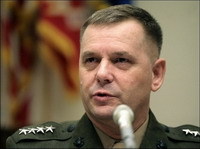Marine Corps legal tribunal to find out roles of two officers in killing of 19 Afghani civilians
Special tribunal will investigate the roles of two officers in the killing of 19 Afghani civilians earlier this year after the Marines' special operations unit came under attack.

The inquiry into the actions of Maj. Fred Galvin, who was a company commander with the 2nd Marine Special Operations Battalion, and the platoon's commander Capt. Vincent Noble, is scheduled to begin Nov. 1 at Camp Lejeune, said Lt. Col. Sean Gibson, a spokesman for the Marine Corps at the U.S. Central Command.
Gibson said other parties could be added to the inquiry, but that there were no current plans to do so.
U.S. Army officials announced in May that 19 people died and 50 were injured March 4 along a crowded roadway in Nangahar province. The Marines opened fire after a minivan laden with explosives rammed a convoy, according to Afghanistan's Independent Human Rights Commission.
Witnesses told the commission the Marines fired indiscriminately at civilian cars and pedestrians, and the Afghan panel found no sign that the patrol was under fire. No Marines have been charged in the shooting.
Officials ordered eight Marines back to Camp Lejeune after the shootings. The rest of the unit was ordered to leave Afghanistan and returned to the ships of the 26th Marine Expeditionary Unit in the Persian Gulf.
Galvin's lawyer, Mark Waple, said his client did not fire any shots and never directed anyone to fire shots.
"Unless we missed something in our interviews, there certainly does not appear to be any violations of the rules of engagement or the laws of armed conflict," Waple said. He said attorneys interviewed every Marine who was on the patrol.
A civilian lawyer for Noble did not immediately respond to messages seeking comment.
Gibson said the inquiry also could focus on such aspects as the conduct of the entire convoy, the unit's discipline in controlling its fire, the reporting and documentation of the incident and the "command climate" maintained by the officers.
Lt. Gen. James Mattis, the top Marine officer at Central Command, will review the findings of the inquiry before deciding whether any criminal charged are warranted. The Marines last used such an administrative fact-finding process in 1956 to investigate a Parris Island drill sergeant who marched a group of recruits into a South Carolina creek, where six died.
Subscribe to Pravda.Ru Telegram channel, Facebook, RSS!




